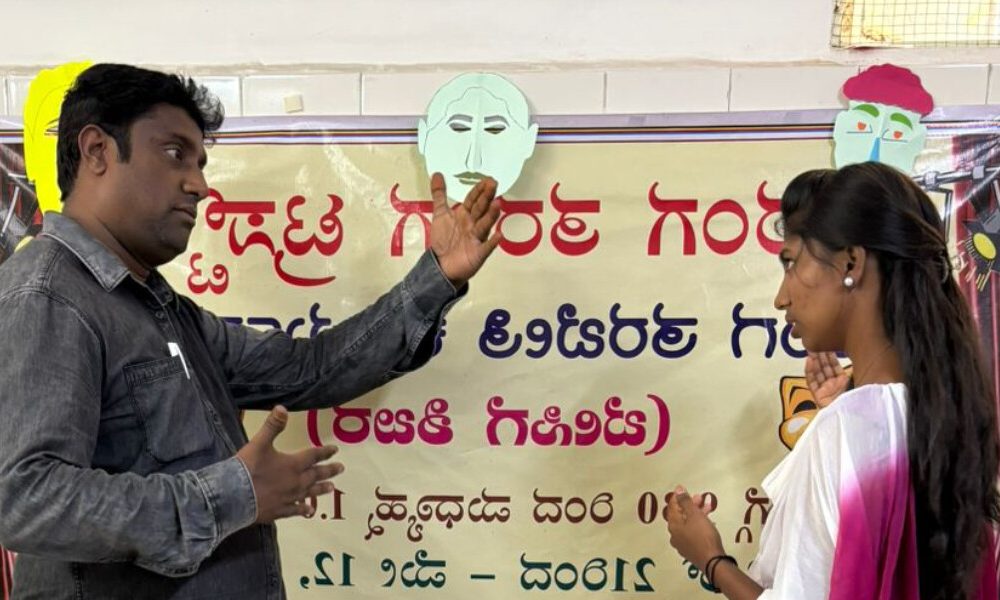Aslam drives his auto rickshaw from 8 AM to 3 PM on the streets of Kengeri. He knows the streets like the back of his hand and has seen it change over the years.
Ever since he was a young boy, barely a man, he drove his rickshaw across its lanes. He was a student of theatre in his twenties. As a young actor, being the sole earner for his family, Aslam had to pay the rent and living expenses of his family – mother, an elder brother and a younger sister.
After twenty years, and many performances for various troupes, not much has changed materially for Aslam. As an older actor, being the sole earner for his family, Aslam continues to drive an auto rickshaw to pay the rent and living expenses of his family – now, his wife and his two daughters who are twelve and nine years old.
“I’m very active in a theatre group called Abhinayataranga. It is also the institution where I did a one year diploma. I am active there and I do plays whenever they call,” says he.
One of the oldest and most well-reputed theatre schools, it has had many prominent alumni like Prakash Raj, who is presently a cinema star.
Acting and driving have been constants in Aslam’s life. He first fell in love with the art form when he saw his best friend perform the role of a drunkard in a college play.
Aslam was twenty years old at the time.. As a second year PUC student, Aslam had little knowledge of theatre. “It was a sudden change in my life. I never had such aspirations, I didn’t even know about theatre as a live performance.For us, theatre was a picture show.”
After that day, Aslam could not get the experience out of his mind. He took his friend to watch a performance of Macbeth starring the late actor, CR Simha. He was enamoured by the sheer artistry of the performance. “The lighting, the makeup, the set design and the performances – we felt like we had been transported to London.”
Aslam resolved to learn how to act, and used a one rupee coin to call and get Abhinayataranga through a pay phone.
When he arrived there, he was greeted by the scrutinizing gaze of A S Murthy, often referred to as the grand old man of Kannada street theatre. Murthy was also a well-known film critic, and was always deeply invested in the quality of the artistry of his peers as well as his students.
When Aslam asked about the fees, the reply, in baritone, was: “Fee is not a criterion here. Why have you come here?”
“I want to learn acting,” Aslam apparently stammered.
“So, what is acting?” asked the baritone.
“Acting is acting.” Aslam belted out, in a fit of nerves and desperation.
Murthy paused for a moment and then said, “illapa… khali illa”. (I’m sorry but we’re all booked up.) We have no more seats left.”
They did have plenty of seats left, Aslam later learnt.
Seeing his eagerness, Murthy gave him a second chance and asked him to act out a scene for him. And incidentally, he was assigned the role of a drunkard. having had his friend’s performance flitting about in the corner of his mind. Aslam enacted the scene, much to the master’s satisfaction.
Aslam then went on to complete his one year diploma in acting. He attended every weekend and sustained himself by driving an auto rickshaw. The same “drunkard” friend got his uncle to hire Aslam to drive one of his autos. “He’s a bank manager now,” he said laughing.
He would drive his auto during the day and attend classes in the evening, for two hours every week.
“I met many people like Prakash Belavadi, B Suresh and TN Seetharam.They were all our teachers.”
After completing that, he participated in many big productions, and had his first taste of fame after acting in a play called ‘meenarugopuragala ooru elli’ directed by B Suresh. He had the lead role. Many newspapers and news channels gave it positive coverage. But Aslam could not enjoy that fame as he still had to keep his auto rickshaw running.
“In that happiness also, I had to earn bread. I was supposed to start my auto and go earn money and after that, reach in time for rehearsals.”
Aslam could not commit to a career in theatre due to financial constraints. “I turned down many plays because I had to earn. It meant many hours dedicated to travel, and rehearsals. But to make rent, I had to decline. What would I pay the house owner and the petrol pump if I spent half a day on rehearsals?”
Aslam’s father had passed away when he was in sixth standard.“There was no guidance for me. My family didn’t know much about my work and my acting. They needed money first. I got married in 2011, in accordance with my mother’s wishes, who was suffering from asthma. She wanted to see me married,” he recalls.
Much older now, Aslam seems to have made peace with his station in life, imparting his experiences and wisdom to his daughters and harbouring hopes for them to succeed in the entertainment industry.
On being asked on what he would have done different if he were younger, Aslam simply stated: “I was supposed to sacrifice something. Fame and success requires sacrifice, I was supposed to get alert and meet many people and leave this town. I was stuck here and I was not ready to let go of my security and my family to chase that. If I could or if I had, I would have become Prakash Raj.”


